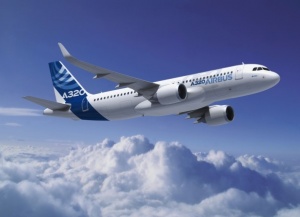Lufthansa places $2.8bn order for new Airbus Neo

Lufthansa has placed a record order of Airbus “Neo” aircraft – a new, fuel-efficient version of its A320 family of short-haul jets. The order for 25 A320neos and five of the larger A321neos is worth US$2.8bn at list prices.
The new fleet boast engines that are 15 percent more efficient than comparable models, and are also quieter. The new jets are expected to be delivered from 2016.
Lufthansa has also ordered five 777 freighter airplanes from Boeing, taking the total value of its orders to $4bn at list prices.
Airbus has already taken a number of big orders for its Neo jets from other carriers including Virgin America and TAM, but Lufthansa is the largest airline yet.
Both Airbus and Boeing are facing growing competition in the short-haul market from Brazil, Canada and China.
ADVERTISEMENT
Boeing and Airbus jointly have a 90 percent market share of the narrow-bodied market with their 737 and A320s. An estimated 20,000 more of such aircraft – typically with a single aisle and between 100 and 200 seats.
However young upstarts, including the likes of Brazil’s Embraer and China’s Comac, have rival aircraft due to enter service within the next couple of years.
Comac is building the C919, which will seat about 156 people and is scheduled for its first flight in 2014. United Aircraft Company, a collection of Russian aircraft makers, will enter its Irkut MS-21 into service in 2014, while Sukhoi’s Superjet 100 could be lengthened to challenge the 737 and A320.
Embraer’s E190 and E195 aircraft and Bombardier’s CSeries are scheduled to enter service in 2013.
Airbus and Boeing have publicly dismissed the threat from new entrants, but both have started plans to update their aircraft.
Airbus may need to wait until 2027 to introduce its new single-aisle plane, because new materials and engine technologies won’t be ready before then. According to a Bloomberg report, the planemaker is instead looking to offer existing A320 models with new engines to help airlines cut fuel costs.
Both Airbus and Boeing had initially considered introducing successors to the A320 and 737 series by 2018. Airbus later moved the target to 2024.
The companies are coming under increasing pressure however, from major airline customers that want a more fuel-efficient short-range plane.
Analysts at UBS report that the best-case scenario for Airbus and Boeing would be that their market shares would fall from 47 percent and 43 percent, respectively, to 38 percent each by 2030. It predicts that Embraer would keep its share at 10 percent, with Comac growing to 14 percent.
In its worst-case scenario, market shares of Airbus and Boeing could slump to 19 percent each by 2030, with the Chinese on 17 percent and several other manufacturers on up to 10 percent.
The duopoly of the wide-body market is expected to be more secure due to the huge entry costs. The cost of developing jets like Boeing’s 787 Dreamliner or Airbus’s new A350 is more than $12 billion, making it unlikely that challengers will break through until 2030 at the earliest.

